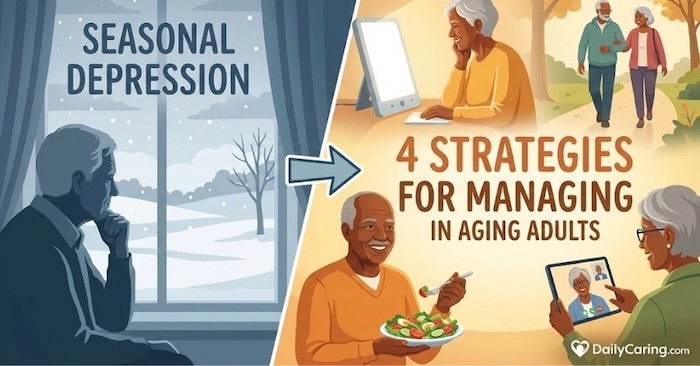Getting an annual flu vaccine reduces the severity and spread of respiratory illness, and the science behind flu shots for seniors is quite compelling.
This is more important than ever because flu, RSV, and Covid-19 are all circulating during the fall and winter seasons.

Flu vaccination is essential for adults 65 years and older, who account for most hospitalizations and deaths from flu and from COVID-19.
We share five reasons why a flu shot for seniors is so essential for protecting their health.
And we explain when getting a flu shot is most effective, which type of vaccine seniors should get, where to get a flu shot, and where to find additional information from a trusted source.
We also share information about the updated COVID-19 vaccine and the new RSV vaccine.
5 Reasons Flu Shots for Seniors are Vitally Important
1. Flu is a serious health risk for seniors
Older adults are among the highest-risk groups for flu, and for them, flu can quickly develop into a severe illness and even cause death.
In fact, the CDC estimates that 70 – 85% of flu-related deaths and 50 – 70% of flu-related hospitalizations happen in people who are age 65 and older.
Getting a flu shot significantly reduces the chance that an older adult will get severely ill.
And even if they do end up getting the flu, already having the flu vaccine makes their illness less severe and less likely to develop into dangerous complications.
2. Seniors and caregivers are at higher risk of flu
Many seniors are vulnerable to seasonal flu because their immune systems are weakened by age and often further compromised by chronic health conditions.
For caregivers, the chronic stress of taking care of your loved one impairs your immune system and makes you more vulnerable to illness.
And spending a lot of time with your older adult means passing germs back and forth.
When you get a flu shot, you’ll reduce the risk that you’ll get sick and infect your older adult. It will also save you the misery of being ill while continuing to care for them.
3. Getting the flu shot reduces flu risk and severity
Even if the flu vaccine isn’t 100% effective, it’s still worthwhile.
Research shows that if someone who is vaccinated does get the flu, they will have a milder case.
People 65 and older are at high risk of serious flu complications and account for the majority of flu hospitalizations and deaths each year.
However, seniors who received the flu shot reduced their risk of hospitalization due to the flu by about 40%.
4. The flu vaccine is free under Medicare
If your older adult has Medicare, the flu shot is free as long as the provider accepts Medicare.
No coinsurance or copayment is needed. And your older adult doesn’t have to meet their deductible to get the vaccine.
Most private insurance companies cover flu shots as a preventive service. If you don’t have insurance, many drugstores and clinics offer flu shots at low cost.
5. Protects against deadly flu complications
A severe form of pneumonia is a common and deadly complication of the flu.
In addition to the flu shot, people age 65 or older, smokers, and those with diabetes or lung problems should consider getting a pneumococcal vaccination.
The pneumococcal vaccine isn’t needed every year, so be sure to check with your older adult’s doctor to find out if they need one this year.
VIDEO: The Essential Immunization Guide for Aging Adults
When should seniors get a flu shot: September – October
With the flu and Covid-19 circulating, the CDC recommends that everyone get vaccinated in September or October – especially adults over age 65.
Ideally, everyone should be vaccinated by the end of October.
After getting the shot, it takes about 2 weeks for the protective flu antibodies to develop in the body.
So, the sooner you and your older adult get the shot, the sooner you'll both have protection against the flu.
And experts agree that getting the flu shot at any time is still much better than not getting it at all.
Note: The CDC states that the flu shot and the COVID-19 booster can be given at the same time.
The High-Dose Flu Shot Is Recommended for Seniors
For the 2024-2025 flu season, it’s recommended for adults over age 65 to get one of three vaccine options:
- Fluzone High-Dose Quadrivalent vaccine
- Flublok Quadrivalent recombinant flu vaccine
- Fluad Quadrivalent adjuvanted flu vaccine
Seniors need these high-dose versions of the flu shot because their immune systems don’t mount as strong a response after receiving the regular-dose vaccine.
That reduces the effectiveness of the regular-dose vaccine and puts them at higher risk of severe illness.
Higher-dose vaccines help older bodies mount a stronger immune response and increase protection against the flu.
Where to Get a Flu Shot: Find a Local Clinic
Flu shots are available at many convenient locations, such as major drugstores, health clinics, and doctors’ offices.
That makes getting a flu shot quick and easy – many of these locations don’t even require an appointment, you can walk in anytime.
Use the simple nationwide online vaccine finder to find a convenient flu shot clinic near you.
You could also contact your doctor’s office or use online flu vaccine finders from major drugstore pharmacies, including:
Vaccine availability can change, so call ahead to make sure they have the specific vaccines you need before you go.
Where to Get More Info About the Flu: Centers for Disease Control & Prevention
To get more information about the flu and flu shots from a trusted, reputable source, visit the CDC's Flu Info page.
There you’ll find out what's new for the current flu season, which types of vaccinations are available, and more.
COVID-19 Vaccines and Boosters May Protect Older Adults from Severe Illness
Older adults are more likely to be hospitalized or die from COVID-19.
In addition to masking and getting early treatment if infected, staying up to date on Covid-19 vaccines protects against severe illness and death.
Click here to find a COVID-19 vaccine near you.
Who Should Get the New RSV Vaccine
RSV stands for respiratory syncytial virus. It’s a virus that infects the lungs and respiratory tract, causing cold-like symptoms.
It's so common that most children have been infected with it by the time they're 2 years old. The virus can also infect adults.
RSV can be dangerous for older adults and any adults with chronic medical conditions or weakened immune systems.
That's why adults 60 years and older should talk with their doctor about whether RSV vaccination is proper for them.
An RSV vaccination helps protect from severe disease or complications and may be recommended for people who:
- Have a weakened immune system from serious illness or from certain medications
- Have chronic medical conditions like heart or lung disease
- Live in a nursing home.
These individuals might be at higher risk of severe RSV disease and an RSV vaccine could help prevent serious illness.
Get more information about the RSV vaccine from the CDC here.
Recommended for you:
- Pneumonia in Seniors: Symptoms, Treatment, and Prevention
- 5 Tips for Choosing the Safest Over the Counter Painkillers for Seniors
- 7 Tips for Helping Seniors at the Doctor: Being a Health Advocate
About the Author

Connie is the founder of DailyCaring.com and was a hands-on caregiver for her grandmother for 20 years. (Grandma made it to 101 years old!) She knows how challenging, overwhelming, and all-consuming caring for an older adult can be. She also understands the importance of support, especially in the form of practical solutions, valuable resources, and self-care tips.













